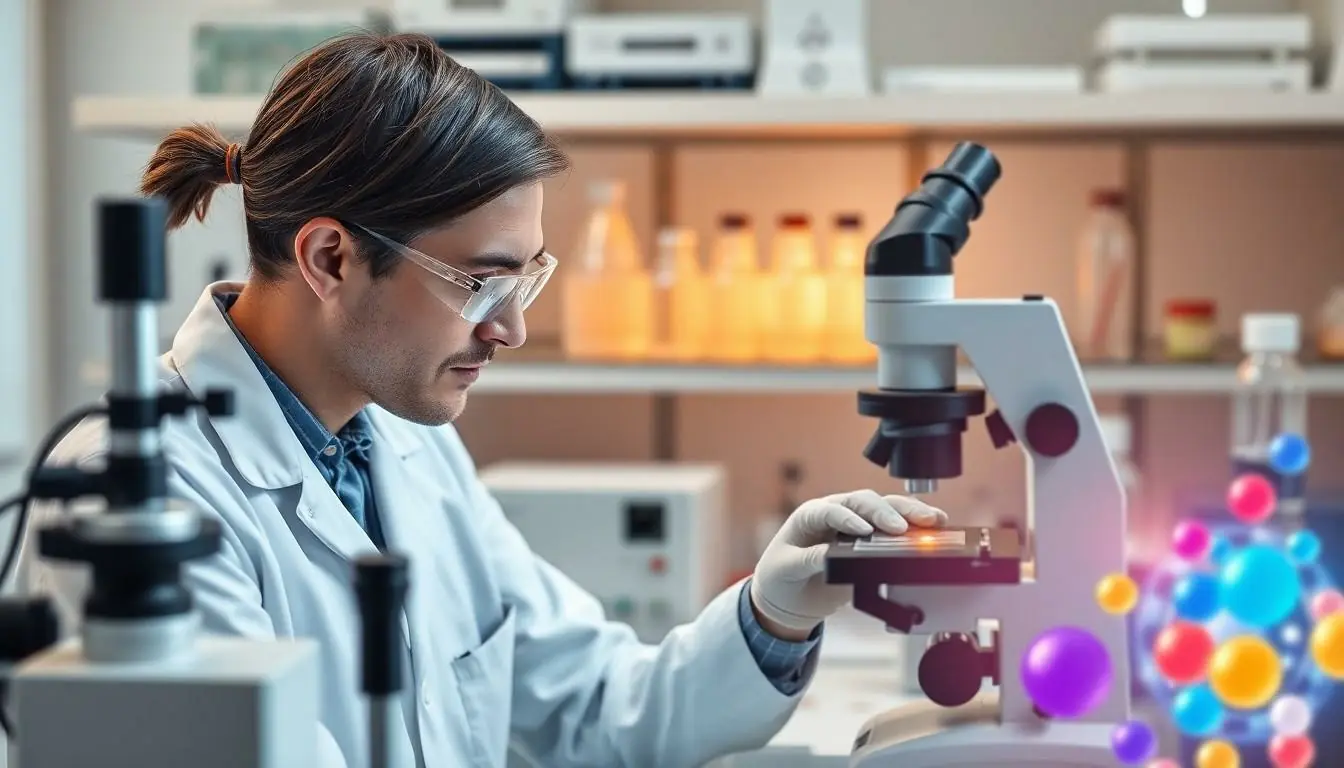Table of Contents
ToggleIn a world where popping pills feels like a game of chance, oral biotech is stepping in to change the rules. Imagine a future where medications are as easy to take as candy, but with the power to transform health outcomes. This innovative field is revolutionizing how we think about drug delivery, making treatments not just effective but also a whole lot more enjoyable.
Overview Of Oral Biotech
Oral biotech focuses on innovative drug delivery methods that enhance patient experience. Using technology to formulate medications into appealing flavors, it mirrors the enjoyment of consuming candy. This approach can significantly improve adherence to treatment regimens.
Significant advancements in oral biotech simplify the administration of complex biologics. By employing techniques such as nanoparticles and oral dosage forms, researchers create options that dissolve quickly and absorb effectively in the digestive system. These breakthroughs enable patients to receive the benefits of traditional injections without the discomfort and inconvenience.
A variety of applications in oral biotech target chronic and acute diseases. These include therapeutics for diabetes, cancer, and autoimmune disorders. Each oral formulation emphasizes ease of use, boosting patient comfort and compliance.
Understanding the role of oral biotech enhances the relevance of these innovations in healthcare. Research shows that over 50% of patients struggle with medication adherence. Oral biotech addresses this gap by offering alternatives that align with patient preferences.
Emerging companies in oral biotech are gaining attention from investors. Funding in this sector has surged, reflecting community support for advancements in health technology. Collaborations between biotech firms and pharmaceutical companies drive the development of new oral therapies.
The future of oral biotech promises even greater innovations that could transform health outcomes. As technology continues to evolve, it shapes the possibilities for drug delivery and patient care, establishing a new paradigm in medication accessibility.
Key Innovations In Oral Biotech

Oral biotech fosters significant breakthroughs that enhance medication delivery and patient compliance. Recent innovations transform traditional medication forms into more appealing options.
Novel Drug Delivery Systems
Nanoparticles represent a game-changing approach within oral biotech. These tiny carriers facilitate the transport of biologics across the gastrointestinal barrier. They enable targeted delivery to specific sites, minimizing side effects. Additionally, oral films and chewable tablets simplify consumption and enhance patient experience. Innovations like these leverage patient-friendly formats to improve adherence rates, addressing the concern of non-compliance in over 50% of patients. Such systems demonstrate remarkable potential in managing chronic diseases effectively.
Advancements In Formulation Technologies
Formulation technologies continue to evolve, producing medications that dissolve quickly in the digestive system. These developments include lipid-based systems that enhance drug solubility, ensuring faster absorption. Techniques like microencapsulation allow for controlled release, distributing the medication over time. Meanwhile, flavor masking agents improve the palatability of bitter medications, promoting acceptance among patients. The emphasis on creating enjoyable forms allows healthcare providers to focus on patient comfort while maintaining efficacy in treatment. Innovations within formulation technologies directly contribute to a paradigm shift in how medications are perceived and administered.
Applications Of Oral Biotech
Oral biotech shows promise in various medical applications, improving treatment accessibility and patient experiences.
Treatment Of Chronic Diseases
Oral biotech plays a significant role in treating chronic diseases. It enhances medication adherence by offering formulations that are easier to ingest and more pleasant to taste. Diabetics benefit from oral delivery systems that provide insulin in more palatable forms, facilitating daily management of their condition. Innovations in this field allow for the development of oral biologics that replace traditional injections, easing discomfort. Techniques such as microencapsulation minimize side effects and improve therapeutic effectiveness, leading to better overall health outcomes. Patients with chronic illnesses appreciate these solutions as they transform cumbersome routines into seamless experiences.
Targeting Rare Genetic Disorders
Oral biotech also targets rare genetic disorders effectively. Novel delivery methods enable precise administration of gene therapies, allowing for direct absorption in the digestive tract. Conditions that require ongoing treatment, like cystic fibrosis, demonstrate improved management through these advancements. Medications that previously required injections can now be taken orally, increasing patient compliance. Innovations in formulation technology, including lipid-based systems, enhance bioavailability and efficacy, addressing unique challenges in rare diseases. Patients and families benefit from the convenience of these therapies, which represent a significant step forward in personalized medicine.
Challenges And Limitations
Significant challenges exist within the field of oral biotech. One major hurdle involves maintaining drug stability during gastrointestinal transit. Many biologics are sensitive to degradation, and formulating them to withstand the acidic environment of the stomach poses difficulties.
Another limitation pertains to absorption efficiency. The gastrointestinal tract presents barriers that often restrict adequate drug absorption. This factor requires innovative delivery systems to enhance bioavailability, emphasizing the need for effective engineering of nanoparticles and other formulations.
Patient variability also plays a critical role. Individual differences in digestive processes can affect how medications are absorbed, leading to inconsistent therapeutic outcomes. Addressing these disparities demands tailored approaches that account for diverse patient needs.
Regulatory hurdles further complicate advancements in oral biotech. Obtaining approval for new delivery systems and formulations can be a lengthy process, often involving rigorous testing and compliance with strict guidelines. Innovators must navigate these pathways carefully, ensuring compliance while striving for rapid development.
Cost considerations represent another challenge. Developing and manufacturing advanced oral delivery systems can be expensive, potentially limiting accessibility for patients. Balancing innovation with affordability becomes essential for widespread adoption of new therapies.
Finally, market acceptance presents a critical barrier. While oral biotech has demonstrated promise, healthcare providers and patients may remain skeptical about transitioning from traditional medications. Building trust in the efficacy and safety of new delivery methods is vital to encourage acceptance and utilization.
Future Trends In Oral Biotech
Emerging trends in oral biotech indicate significant potential for innovation in drug delivery systems. Advanced formulations using nanoparticles show promise in enhancing the transport of biologics across barriers in the gastrointestinal tract. Emerging oral dosage forms, such as films and gummies, attract patients looking for alternatives to traditional methods.
Innovative formulation technologies improve solubility, allowing medications to dissolve rapidly. Enhanced lipid-based systems and microencapsulation techniques offer controlled release options. Flavoring agents increasingly mask unpleasant tastes, contributing to improved patient compliance.
Applications for chronic diseases are expanding. Solutions for diabetes include oral insulin formulations that replace injections, greatly enhancing patient experience. Rare genetic disorders benefit from targeted delivery methods, enabling effective administration of gene therapies through the digestive tract. This shift not only simplifies treatment but also addresses adherence challenges for patients.
Investors are showing heightened interest in oral biotech, leading to increased funding in this sector. Collaborations among biotech firms and pharmaceutical companies drive the introduction of new therapies, fostering innovation. Opportunities for market growth are increasing as the demand for patient-friendly medication rises.
Challenges in maintaining drug stability during gastrointestinal transit persist. Certain biologics are susceptible to degradation, complicating efficacy. Addressing absorption efficiency remains a priority as the gastrointestinal environment can limit adequate uptake of medications.
Regulatory pathways for new delivery systems are complex. The process for obtaining approval requires thorough testing and compliance with established guidelines, impacting the speed of innovation. Developing advanced systems incurs significant costs, which can restrict patient access. Building trust among healthcare providers and patients is essential for successful adoption of these innovative treatments.
Oral biotech is poised to redefine the landscape of medication delivery. By prioritizing patient experience through innovative formulations and appealing flavors, it addresses the critical issue of medication adherence. As advancements in drug delivery systems continue to emerge, the potential for improved health outcomes becomes increasingly tangible.
Despite the challenges that lie ahead, such as regulatory hurdles and the need for tailored approaches, the commitment to enhancing patient compliance remains strong. The collaboration between biotech firms and pharmaceutical companies signals a promising future for oral therapies. As technology evolves, oral biotech will likely play a crucial role in making medications more accessible and enjoyable for patients, transforming how they manage their health.







